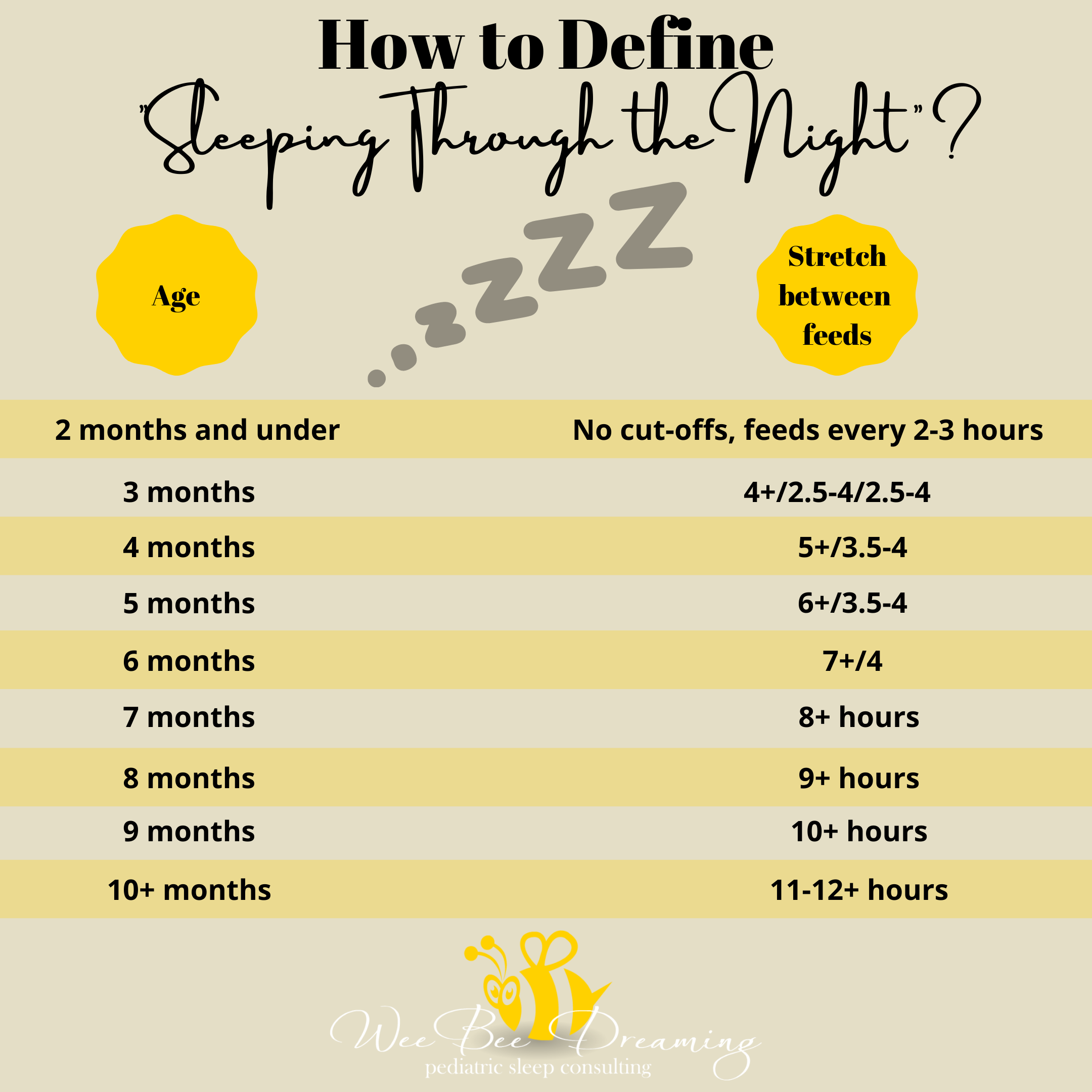Everybody has that friend.
The one who says that their baby sleeps through the night at 6 weeks. But the definition of 'sleeping through the night' is different to some than others.
For me, this means baby is sleeping 10-12 hours at night with no feedings. To others, this might mean that baby is still waking up for 1-2 feedings, but promptly returns to sleep afterwards. Or even others, their baby might be getting way less than the recommended 10-12 hours of nightsleep, maybe only 7-8 hours, and although it's uninterrupted sleep, it's not nearly enough.
In general, a baby is capable of going 10-12 hours at night with no feedings around 8/9 months, as long as solids are well-established and weight gain is sufficient according to your pediatrician. Anything earlier than this is a bonus!
To give you an idea of what is in the realm of normal for your baby at any age in terms of feedings at night, here is what you can expect from birth to the age of 1. Please note that all babies are different, and if your baby has more feeds at night - that is fine! If they have less - you are lucky!
Under 2 months of age - babies need to eat around the clock day and night, so this might mean baby is waking up every 2-4 hours at night for a feed. This is completely normal, especially if baby has their days and nights mixed up. One way to help them get their nights and days sorted out is to ensure that you are waking them up during the day every 2-3 hours for a feed.
3 months of age - around this age we start to see a longer first stretch of sleep emerge as sleep patterns begin to mature. Most babies will do a 4 hour first stretch, and then may wake up every 2.5-4 hours thereafter (usually about 3 feeds/night).
4 months of age - The first stretch is increased to around 5 hours, and the 2nd feed happens about 3.5-4 hours later. Most babies only have 2 feeds at this point.
5 months of age - First stretch around 6 hours, 2nd feed is happening around 3.5-4 hours later.
6 months of age - As solids begin, most babies at this age are only waking up once at night to eat. Their first stretch may be about 7 hours long, and they may be comfortably able to go until wake-up time for another feed. Before we start enforcing this one nightly feed, we want to make sure that solids are well-established for baby; this means 3 meals a day containing all 4 food groups in addition to the milk feeds: grains, protein, fruit/vegetables, and fats.
7 months of age - Babies at this age who are eating a range of solids may be down to 1 feed/night, sometime after midnight, typically about 8+ hours after the bedtime feed.
8 months and beyond - This is around the age where we can begin to work on baby sleeping a full, consolidated 11-12 hours of sleep every night. Do not worry if your baby is still feeding at night - he will get there! If you find that he is still waking up for a feed in the wee hours, try moving his nursing/bottle from the end of his bedtime routine to the beginning (i.e. before bath, jammies, etc). If you try this and he is still waking, move it even further away from sleep time, to immediately before/after dinner. We want to completely seperate feeding from sleeping in their little brains, as this association is very strong and can cause them to continue waking at night.
If you feel that your baby might need a little help in the nightweaning department, check out my step-by-step nightweaning blog here! And next time a well-intentioned friend tells you their baby is 'sleeping through the night' at 3 months of age, don't feel like you are doing anything wrong - there may just be a difference in definition.


